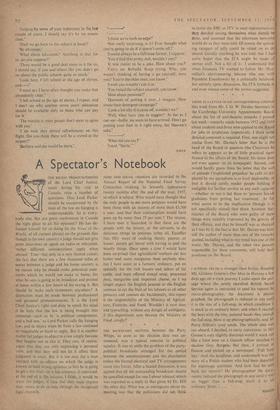A Spectator's Notebook
'rtie RECENT PRONOUNCEMENTS of the Lord Chief Justice, made during his visit to Canada, raise a number of questions. That Lord Parker should be exasperated by the state of the law on hanging is understandable. So is every- body else. But are press conferences in Canada the right place to air his opinions? He has de- fended himself for so doing (in the News of the World, of all curious places) on the grounds that though in his own country a judge should not give press interviews or speak on radio or television, 'rather different considerations apply when abroad.' True—but only to a very limited extent; the fact that there are a few thousand miles of ocean between a judge and his home country is no reason why he should make polemical state- ments which he would not make at home, for what he says is going to be broadcast and printed at home within a few hours of his saying it. But should he make such statements anywhere? A distinction must be made between professional and personal pronouncements. It is the Lord Chief Justice's right and duty to speak his mind if he feels that the law is being brought into contempt- such as by 'a political compromise, and a bad one,' as Lord Parker calls the hanging law; and to object when he finds a law confused or inequitable or hard to apply. But it is another matter for judges to object to a law simply because they happen not to like it. They can, of course, argue that they are only expressing a personal 'view, and that they will not let it affect their judgment in court. But it is not easy for a man charged with an offence on which the judge is known to hold strong opinions to feel he is going to get a fair trial---•or a fair sentence, if convicted, at the end of it. On balance, I think, it would be wiser for judges. if they feel they must express their views, to do so only through the recognised legal channels.


































 Previous page
Previous page